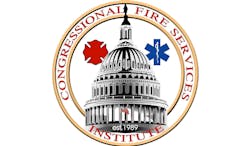After Successful Year, More Work Ahead on Capitol Hill
It was a year of both success and setbacks for the nation's fire service on Capitol Hill.
That's how CFSI Executive Director Bill Webb explained the recent session.
Webb said once again members and officials with the major fire service organization reached out to promote the importance of funding various initiatives.
"It's tough to get full funding. We know that," Webb said.
As new members of Congress take their seats, Webb said it's essential that fire officials from across the country take the time to educate their local leaders about the service. Identifying legislators who are willing to promote initiatives is vital.
Among the measures achieved include:
- $10.5 million for the Supporting and Improving Rural Emergency Medical Service’s Needs (SIREN) program. The program, which benefits EMS in rural areas, received an increase of approximately $3 million over prior year funding.
- $5.5 million for the National Firefighter Registry (NFR). Working with our partner organizations, CFSI helped secure an additional $3 million more than the budget request for the NFR as it moves towards open enrollment.
- Additional $1 billion for the World Trade Center Health Program (WTCHP). CFSI worked with our partners to advocate for the increased funding for the WTCHP, which provides health benefits to 9/11 first responders and survivors. Without the additional funding, the WTCHP would have cut services and denied new enrollments.
- $2 million for carbon monoxide alarm installation and educational grants at the Consumer Product Safety Commission. CFSI and our partner organizations worked with congressional members to have these grants created through the Nicholas and Zachary Burt Memorial Carbon Monoxide Poisoning Prevention Act, which became law in March 2022. We then worked to secure funding for these grants through the appropriations process.
- $76 million for State Fire Assistance (National Fire Capacity) grants. This is an increase of $1 million over the prior year enacted level.
- $21 million for Volunteer Fire Assistance (Rural Fire Capacity) grants. This is also $1 million more than the prior year enacted level.
- $4.5 million for the Joint Fire Science program. This is an increase of $500,000 from prior year funding.
Webb said despite tireless efforts from advocates, Congress did not reauthorize the AFG and SAFER programs or the USFA.
"AFG and SAFER programs have sunsets. We need to have it extended," he said, noting that departments need the funds to provide services.
"We didn't prevail but I it was not because of a lack of effort. People were passionate and worked together."
Webb said they will be headed back to Capitol Hill to promote the agenda.
In late September, the Senate Homeland Security and Governmental Affairs Committee favorably passed legislation that would reauthorize the three through 2030, and place a 2032 sunset on SAFER and AFG. It also would boost the USFA budget from $76.5M to $95M, according to a CFSI report.
About the Author
Firehouse.com News
Content curated and written by Firehouse editorial staff, including Susan Nicol, Peter Matthews, Ryan Baker and Rich Dzierwa.
